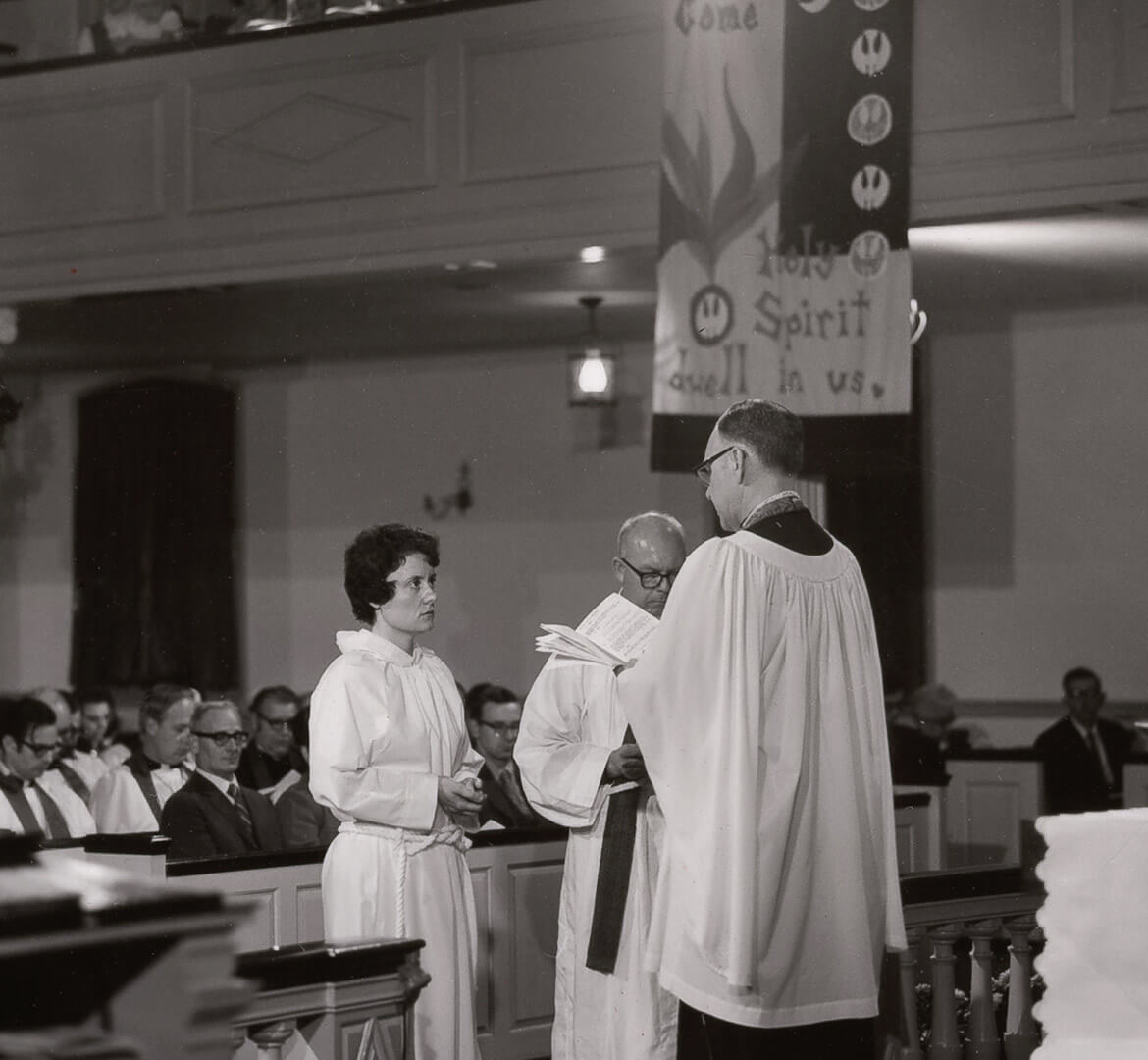- November 19, 2020
- By Sala Levin ’10
“Whore of Babylon.” “Representative of Satan.” Not the most likely of nicknames for a pastor, but these were among the slurs thrown at Elizabeth Platz in 1970 when she became the first ordained Lutheran woman in the Western Hemisphere. She wasn’t deterred. “As I say, I wish I had that kind of power,” Platz said.
Nov. 22 marks the 50th anniversary of Platz’s ordination, held during her 47-year tenure at the University of Maryland, first as an associate in campus ministry and then as Lutheran chaplain. Over the decades, even as she initially faced challenges from a subset of more conservative Lutherans nationwide, Platz became a key figure in the life of the university, steadily pushing for equity, especially for women, graduate students and residents of nearby neighborhoods, and gently shaping the lives of students.
 “Maybe it’s a character flaw in me, but I don’t let things stop me from what I want, (as long as) I’m focused and I don’t see any reason not to do it,” said Platz, now 80.
“Maybe it’s a character flaw in me, but I don’t let things stop me from what I want, (as long as) I’m focused and I don’t see any reason not to do it,” said Platz, now 80.
Born and raised in Pittsburgh, Beth Platz grew up in a family that attended church not out of any particular piety but simply as a way of life. “You went to Sunday School and you went to church,” she said. “We were really involved in church, but it was nothing extraordinary in the neighborhood.”
A good student, Platz won a scholarship to attend any college in Pittsburgh. She chose to pursue teaching at what was then a women’s school called Chatham College. (The school is now co-ed Chatham University.) The school “really emphasized learning anything you were interested in,” Platz said. After taking a course that introduced her to existentialism and the work of Soren Kierkegaard, she became interested in philosophy and religious studies, a route that had one logical conclusion at the time: seminary.
After arriving at Lutheran Theological Seminary in Gettysburg, Pa., Platz discovered a hiccup in her plan. “Nobody bothered to tell me that the Lutherans didn’t have a lot of women who studied theology in their seminaries,” she said. Instead, the other four women enrolled were on the education track. Platz persuaded the administration to let her take on the Bachelor of Divinity program.
Upon graduating, Platz was hired by the Lutheran church to serve UMD, where she found an accepting community. She focused on religious education within the campus ministry and organizing student activities, but as the years went on, she felt something was missing. That something, she eventually realized, was “a relationship where I could help students with questions they had about their relationship with God and with one another, including Holy Communion and marriage—things reserved for pastors," she said.
In 1970, the Lutheran Church of America changed its constitution to allow for the ordination of women. That November, Platz officially became the Rev. Elizabeth Platz during a ceremony that took place at UMD’s Memorial Chapel.
During the rest of her career at Maryland, Platz became an advocate for change, from providing child care for graduate students to improving working conditions for custodial staff. “She’s not afraid to hold a mirror up in front of an institution or people and say, ‘We’re not doing it right. We’re not doing it well,’” said Marsha Guenzler-Stevens, director of the Adele H. Stamp Student Union, who has known and worked closely with Platz, including on the President’s Commission on Women’s Issues, since 1982.
Platz also invested in the community around the university. She began the CARing Project, which pairs local elementary schoolchildren with UMD students for tutoring in reading and math. “She always wants to make sure people don’t get rooted in the university bubble,” said Ray Ranker ’04, UMD’s current Lutheran chaplain who knew Platz well when he was a student. “We are rooted in this context where it’s important to be connected with our surroundings, and it’ll not just help make a child’s day bright, but you (the university student) will be transformed by this relationship.”
Interfaith programming was also important to Platz, who established the Wofford K. Smith Religious Life Program Fund in memory of her late husband, who had been the university’s Episcopal chaplain. “Both of them are incredibly important in the history of this university for so many reasons,” said Guenzler-Stevens, pointing to, among other moments of leadership, their steadying presence during the tumultuous Vietnam War years.
For many students, Ranker said, Platz, who retired in 2012, was an anchor, beloved both for her stability and for her home cooking, which she shared frequently. “You could call her, and if you had a problem, she would be there,” he said.
Topics
People